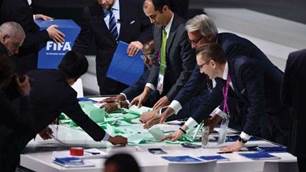Meanwhile, Dave Smith finishes on winning note.
Introducing the winners and losers from another controversial month of sport just played out ...
WINNERS
Dave Smith
Some first impressions can’t be overcome, and that seems to be the case with Dave Smith. Rugby league fans couldn’t get over their sense of the now ex-NRL boss as an interloper, which tinged the rather muted reaction to his departure. Curiously, though, a lot of the criticism thrown his way was about what he didn’t do – the primary thing being the shortfall of TV rights compared to what the AFL will get. We’re into proving-a-negative territory here; either that, or trying to deal with the NRL community’s collective neurosis that it should be just as important as that other league headquartered in Melbourne. Smith’s ouster will eventually be seen as the product of a wider move by the clubs to assert control over the game, which will take aim not only at head office, but the commission. League politics will continue to roil, and in this fervent desire to bring in a chief executive who “gets” the sport, the message to anyone bringing change from the outside is clear. In the end, Smith gets to extricate himself from this after three years with accomplishments he can point to, a record that will likely look better over time.
Our rugby hemisphere
Couldn’t help but love those internet memes that illustrated how rugby’s “World” Cup only applied to half the planet. Yep, it’s a proud moment for our rugby hemisphere, which went to the game’s historic birthplace and proceeded to lock their northern counterparts out of the tournament’s last four. Furthermore, the open, athletic style of the south proved itself an effective way to win, as well as an attractive way to play. Particular credit should go to Argentina, now a two-time Cup semi-finalist and on the cusp of joining Super Rugby – seeing how the sport has progressed there over the last few decades is proof of what can be cultivated when a game commits itself to being global. Some astute observers noted that there was a bit too much being read into what was essentially a handful of rugby matches. But what’s a World Cup for if we can’t gloat?
Bye week before the finals
Trying to predict the future is always a danger when it comes to next year’s footy fixtures, but we’ll give credit to the AFL’s idea to introduce a bye week before the finals. The league’s main concern was to try and eliminate the kind of non-competitive farce that this season’s round 23 became, with finals-bound teams resting first-choice players. There’s no guarantee that a bye will do that, and as AFL chief Gillon McLachlan said, there’s also a risk momentum would be lost. But it’s not like supporters will abandon finals footy because they’ve been made to wait, and there’s something to be said for some breathing space after six-plus solid months of weekly action. The ideas for side-action to fill the space (women’s games, awards nights) are intriguing. And if the experience of the Super Bowl is any guide, the bye week only creates more hype from an expectant media.
 The chorus of pink-ball criticism at the start of this summer's cricket schedule seemed awfully late. (Photo by Getty Images)
The chorus of pink-ball criticism at the start of this summer's cricket schedule seemed awfully late. (Photo by Getty Images)LOSERS
Pink-ball criticism
The chorus of pink-ball criticism at the start of this summer’s cricket schedule seems awfully late, if the players were indeed sincere in their concerns about the ball that will make day-night Tests a reality. The players sounded like they were more vexed by the inconvenience of it all – a reminder that professional athletes, who to be fair are dealing with issues of livelihood here, can be remarkably conservative about potential change. As Cricket Australia made clear, there’s no diverting from the agenda. There’s too much at stake in the day-night experiment and what it means for the future of the five-day format. The pink ball may not prove to be the panacea for Test cricket’s dwindling popularity around the world, but a lack of initiative will surely doom the traditionalists’ game to cultural irrelevance. It’s a curious historic turn – if a previous generation’s players led the way for World Series Cricket and limited-overs games that turned on the lights, what does it say about the current era?
Craig Joubert incident
Benefitting from a bad refereeing decision always brings out profound mendacity, and much of Australia was guilty of it in regards to the Wallabies’ World Cup quarter-final win over Scotland, aka the Craig Joubert incident. One side squeals, the other shrugs, and you can only hope that when the ref’s bad call comes to haunt your team, it doesn’t happen in a really big game. The worst thing to come out of this – yes, even worse than the sight of Joubert running from the field – is World Rugby feeling the need to make a public statement that the South African had made an error, which was an exquisite act of hanging Joubert out to dry while the bus ran over him. It reflected the clamour being heard across so many sports for referee “accountability”, which is a spectacularly bad idea. Refs, unlike coaches, shouldn’t have to explain their decisions. Rather, most of us can agree that our sports are at their best when we don’t have to hear much from the whistle-blower at all. How about working towards that, rather than creating an environment where no one in their sane mind would do the job?
FIFA
Another month has gone by, and Sepp Blatter is still FIFA president – albeit a lame duck, handed a suspension by his own ethics committee for allowing an uninvoiced multi-million-dollar payment to go to UEFA chief Michel Platini. Platini, too, is benched, and somewhat vexed at his treatment. How could we not understand that this was money owed to him from more than ten years ago? That the Frenchman apparently performed some professional services that had somehow gone overlooked within that organisation ... But the fact is, Blatter is still there, and a new president won’t be elected until March. Platini had been billed as his most likely replacement; now we discover that these one-time allies despise each other. Still, we are looking at an organisation that appears corrupt to its marrow. The hopes of finding a cleanskin candidate to take it over and purge it appear increasingly remote; though at last count there were at least six candidates with their hands up, none appear to stand out as reformers. Journalist Andrew Jennings is probably right. World football needs a new governing body, built from the ground up. FIFA needs to be burned down to make way for it.
Ingrained footy habits
Jarryd Hayne’s NFL adventures have brought into focus the curious differences in football cultures, and how ingrained footy habits can be tough to break. We’re not just talking “why doesn’t Hayne toss it around”-type stuff here. At the college level, there was a now-notorious incident involving Australian Blake O’Neill, a punter for the University of Michigan. O’Neill, an Aussie rules player from Melbourne, only had to get a last-second punt away for his team to defeat rival Michigan State University in one of the biggest games of the year. He fumbled the snap, and instead of falling on the ball, as all players on the gridiron are taught, he tried to kick it. The State players recovered and scored a touchdown at the death, leaving Michigan fans shell-shocked. O’Neill’s coach at Prokick Australia, Nathan Chapman, was left to explain: “He probably should have jumped on it, but jumping on the ball is not what we do here.”
Related Articles

We need to formalise the ownership of bragging rights

FIFA earning high praise for its widespread reforms




.png&h=115&w=225&c=1&s=1)









